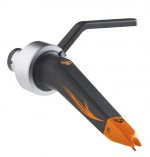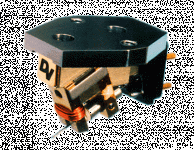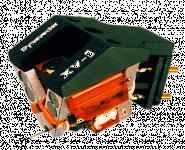Why don't you guys use a hot air tool for soldering fine pitch SMDs? Works great for DFNs as well. I use a tipped iron only for tinning the PCB pads before the hot air reflow. Reworking is a breeze.
Which do you use? I have had mixed results with IR and hot air tools, most likely due to impatience / user error.
Paste, stencil, and oven become easier at some point.
I’m simply saying it’s easy enough to design an RIAA with enough headroom to enable it to deal with virtually any eventuality.
Not to mention the solution of cascoding a low noise jfet with a tube. Combining the jfet low noise with 40dB of overload margin, and making passive RIAA an effective option.
As funny as it sounds, I've seen this solution mentioned on this forum by a reputable high end audio designer (holding the name since he is no longer posting). IIRC there are commercial phono stages designed around this concept.
Which do you use? I have had mixed results with IR and hot air tools, most likely due to impatience / user error.
Paste, stencil, and oven become easier at some point.
An original Hakko 852 (not a Chinese knock off).
Not an option for me. I cannot justify the cost of stencils, good solder paste and a reflow oven for 2...3 boards I'm building for each project.
I offered proof that more people could prove they could hear small distortion, if they had an FFT analyzer, and a good sabre dac with register level access.
Same kind of thing as you suggest, 'you can easily prove it yourself,' type of claim. Most people won't do it, as you probably know. Just like most who solder SMD with an iron won't bother with hot air. All we can do when we offer tips is hope that maybe someone will try something new.
I don't want or need to prove anything. If you want to solder your fine pitch chips
with the tin left over from your last rain gutter repair, that's fine for me.
If an order at Segor's is impossible for you, I might be talked into sending you a few
meters of the good stuff.
If an order at Segor's is impossible for you, I might be talked into sending you a few meters of the good stuff.
Thank you for the kind thought.
Right now I use .3mm leaded, and a Hakko fx-951 iron. It works pretty reliably, although I do have to use wick every once in awhile (usually my own fault).
Wasn't that clear, what follows is anecdotal, from all sides I have no problem with that? "You really can" is a statement of fact. There is anecdotal evidence that some people think they can under some circumstances is more accurate.
The evidence you look for are not trivial to obtain(how do we collect knowledge in observational sciences?) and the argument from ignorance for "absence of evidence" isn't necessarily fallacious.
Furthermore, lack of scientific understanding of something does not mean that we can't understand it at all.
Claiming otherwise is just scientism. Very common among die hard rationalists and "objectivists"(whatever that might mean here)and it often tips into anti-tolerance and philistinism.
Are you also jkeny on Hydrogenaudio?Could you point to large scale controllel listening tests
anti-tolerance and philistinism.
Plenty of that to go around on "both" sides. I said I'm happy to accept that neither side has any evidence on some of these issues. But I predict that tomorrow I can open my browser and search and easily find yet another claim of "you have to be deaf not to hear this instantly".
Or "the stress of DBT got to the listener".Plenty of that to go around on "both" sides. I said I'm happy to accept that neither side has any evidence on some of these issues. But I predict that tomorrow I can open my browser and search and easily find yet another claim of "you have to be deaf not to hear this instantly".
Somebody said at some moment that designing a phono preamp able to defend its stance by itself is a stupid thing to do.It is true and not true depending on the source , on the amps and speakers .
There are 2 clear reasons why, with the same lousy low quality phono preamp you can't notice the clicks and pops on a 45rpm record the same way as on a 33rpm record:
1: the higher needle kinetic energy can remove the dust by itself much easier even with a lower stiffness cart usually used on 33rpm
2: the noise to signal ratio is higher on a 45rpm record and music become more noticeable than dust.
3.The carts made specifically for 45 are more rigid .
All these together can't make for the fact that clicks and pops don't matter.They do, but every technology has a way to deal with it.
I spent enough time investigating how you can deal with it to know that there's not a single way to tackle the problem,
BUT THE BEST WAY IS TO CLEAN YOUR RECORDS AND KEEP A LID ON YOUR TURNTABLE , keep your house clean and that's all folks! ...Water and soap...cheap cleaning solutions...
Record them on a good sound card and listen to them forever!
Use the phono setup only to transfer the vinyl into digital and listen only on good digital equipment and let the dust back it as you don't need your kids to have allergy problems or get leukemia later in their lives.
Dirt is good!
The only thing that remains for you is to build SW or JC phono preamp and give it a try.
For me it seems like a too expensive preamp to build since i found cheaper ways to get good results.
I challenged Scott to show his wonder digital preamp in a physical form and all i got was an indication to a Linear article and digital software platforms...
As for buying the Linear article on Scott's digital preamp, I already bought Arto Kolinummi's book on amplifiers 3 years ago...I think that's enough for me.I'm poor...I can't buy expensive things!
I prefer water and soap.
This is for JC's DA:
Please look at the most expensive mc cartridges in the photos attached! They have slew rate "killers" by default !
Do you see any relationship with the dust existence ?
And this is for FUN:
http://tesi.cab.unipd.it/42449/1/Tesi_Lorenzo_Bortot_-_1014762.pdf
There are 2 clear reasons why, with the same lousy low quality phono preamp you can't notice the clicks and pops on a 45rpm record the same way as on a 33rpm record:
1: the higher needle kinetic energy can remove the dust by itself much easier even with a lower stiffness cart usually used on 33rpm
2: the noise to signal ratio is higher on a 45rpm record and music become more noticeable than dust.
3.The carts made specifically for 45 are more rigid .
All these together can't make for the fact that clicks and pops don't matter.They do, but every technology has a way to deal with it.
I spent enough time investigating how you can deal with it to know that there's not a single way to tackle the problem,
BUT THE BEST WAY IS TO CLEAN YOUR RECORDS AND KEEP A LID ON YOUR TURNTABLE , keep your house clean and that's all folks! ...Water and soap...cheap cleaning solutions...
Record them on a good sound card and listen to them forever!
Use the phono setup only to transfer the vinyl into digital and listen only on good digital equipment and let the dust back it as you don't need your kids to have allergy problems or get leukemia later in their lives.
Dirt is good!
The only thing that remains for you is to build SW or JC phono preamp and give it a try.
For me it seems like a too expensive preamp to build since i found cheaper ways to get good results.
I challenged Scott to show his wonder digital preamp in a physical form and all i got was an indication to a Linear article and digital software platforms...
As for buying the Linear article on Scott's digital preamp, I already bought Arto Kolinummi's book on amplifiers 3 years ago...I think that's enough for me.I'm poor...I can't buy expensive things!
I prefer water and soap.
This is for JC's DA:
Please look at the most expensive mc cartridges in the photos attached! They have slew rate "killers" by default !
Do you see any relationship with the dust existence ?
And this is for FUN:
http://tesi.cab.unipd.it/42449/1/Tesi_Lorenzo_Bortot_-_1014762.pdf
Attachments
Last edited:
And this is for FUN:
http://tesi.cab.unipd.it/42449/1/Tesi_Lorenzo_Bortot_-_1014762.pdf
Fun for sure "shock" in the price of cobalt in a technical paper.
Why use lead solder when a wide range of lead free alloys are available nowadays ?.Thank you for the kind thought.
Right now I use .3mm leaded, and a Hakko fx-951 iron. It works pretty reliably, although I do have to use wick every once in awhile (usually my own fault).
Dan.
If you're doing production you need lead free for legal (EU/ROHS and such) reasons.Why use lead solder when a wide range of lead free alloys are available nowadays ?.
Dan.
For one-offs and repair, eutectic 63/47 tin/lead is The Stuff because it "plays nice" and melts at a lower temperature than lead-free. It does better for working by hand, and for anything doing with SMT it gives more temperature margin with hot air soldering and rework before cooking the magic smoke out of chips.
There's also the tin whiskers thing, alleged in potentiometer-driven accelerator pedal in the Toyota "unintended acceleration" problem. There seems to be conflicting statements regarding it being "the problem" with Toyota, but I read about tin whiskers growing on lead-free solder joints in the late 1990s when ROHS legislation banning leaded solder in the EU was starting to be a thing. Electronics meant for spacecraft was about the first exemption claim.
Yeah, lead is a poison, but now I know to wash my hands after touching solder, unlike when I was building my first Heathkit at age 8.
ETA: the Google search string: nasa tin whiskers toyota
Last edited:
Last edited:
Granted that "you are spouting nonsense to hear any of that" helps wrt snake oil stuff, but also kills off the search for better solution on some real issues.Plenty of that to go around on "both" sides. I said I'm happy to accept that neither side has any evidence on some of these issues. But I predict that tomorrow I can open my browser and search and easily find yet another claim of "you have to be deaf not to hear this instantly".
- Status
- Not open for further replies.
- Home
- Member Areas
- The Lounge
- John Curl's Blowtorch preamplifier part III


